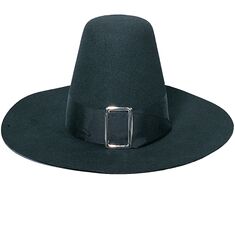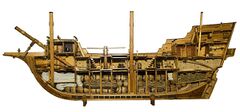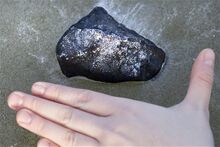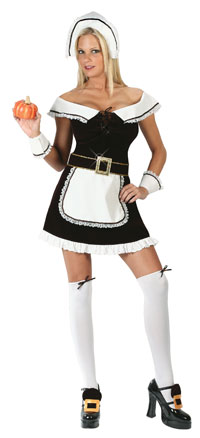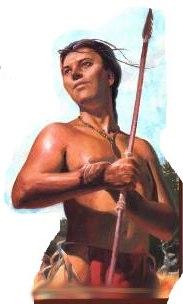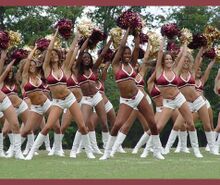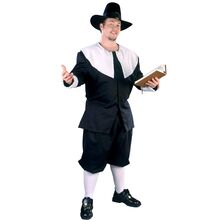The Pilgrim Fathers
“Happy Thanksgiving, Pilgrims!”
Seventeenth century England was a dangerous place; politically uneasy and religiously intolerant. But not intolerant enough for Pastor William Brewster who expelled himself from the Church of England when the General Synod disagreed that evading Roman excise duties by miraculously producing wine proved Jesus had deserved crucifixion. In 1604 King James I decreed puritans to be "undesirable" as his interests had moved onto young girls, and it seemed increasingly likely that Brewster's minions would be expelled from the Nottinghamshire village of Scooby due to persistent allegations of "interfering [with] kids".
Where could Brewster and his followers live where they could create a society in their own image, where laughter would be punishable by death and non-procreative sex prohibited (except with livestock)? Rumours abounded of a vast land across the mighty Atlantic Ocean inhabited only by savages ripe for being disapproved of and then exterminated. But how would they get there?
By 1607 Brewster had amassed a fortune in the manufacture of ducking-stools for witch-drowning and had placed an advertisement in the Puritan News-sheet "The Burning Issue" asking for “Gentlefolk of good character for the colonisation of a New World to the glory of God (No drunkards, no Jews, no third nipples.)” Soon over 100 applicants had assembled in Humberside and by early 1608 had boarded ship despite the interference of James I’s government. Within days they had landed at Amsterdam, following Brewster’s confusion of the Hull-Hook of Holland ferry with the Speedwell, the ship he had chartered for the journey.
Undeterred by this set back, the Pilgrims settled around Leiden where Brewster bought an estate and began a match-making business to aid Prince Morits of Nassau in his righteous quest to incinerate the remaining Catholics in the Lowlands. By 1615, however, many in the community began to fear that the Dutch people were a corrupting influence, their melodic language and tulips turning the young Pilgrims against their families. Brewster made two decisions: first he decreed that all Pilgrims should adopt clogs of un-sanded gopher-wood to remind the wearers of the suffering of Noah on the high seas, and secondly to appeal to the British government for a grant of land in the Americas where they could create a society of their own without fear of persecution for their choice of pointy headwear.
When land on the Hudson River was granted, 121 intrepid men, women and children set out in the re-chartered Speedwell and newly commissioned Mayflower. Surely it was these brave souls who laid the foundations of American liberty.
The Voyage
The voyage across the Atlantic had barely started when sailors drilled holes in the side of the Speedwell and raised the alarm to avoid the eighth of Brewster’s regular nine Sunday sermons. The Pilgrims were forced to land at Southampton. Two weeks later, with all equipment and passengers loaded onto the Mayflower, they set off again but terrible storms in the English Channel threatened to overwhelm the would-be settlers. Not everyone on board shared the Pilgrim's faith; the so-called "Strangers" (non-Pilgrim settlers) included Myles Standoffish, the brave but haughty military leader of the colony, and Christopher Martin, the intended Governor. The Strangers insisted that they should return to Plymouth despite Elder Brewster's insistence that God would preserve them from the angry ocean.
Setting off a second time, the colonists made good headway until an anti-cyclone (a sternly disapproving type of weather system much admired by Puritans) again threatened them with disaster. Pilgrim John Howland was swept overboard and only by luck (or divine intervention) managed to rescue himself by grabbing a trailing halyard. This miraculous event helped persuade the Strangers to continue and, when the main mast cracked, they continued onward to the New World repairing the mast with the ram-rod straight spines of ten Pilgrims who lashed themselves to the mizzen for the remainder of the voyage.
With the dangers of the Mid-Atlantic passage behind them, the Pilgrims gave thanks that only one sailor had died. To show their faith matched that of the biblical Isaac, Brewster decreed that they should sacrifice Stranger Owen Price in God's honour, and because his name had raised suspicions of Welshness.
Land was sighted on November 9th off the coast of Cape Cod and, though they were far from their intended landfall, thanks was given once more, this time by forcing one of the 20 female pilgrims to give birth. Mother Elizabeth Hopkins named the baby boy Oceanus so that he might be more persecuted at school and so better understand Jesus' anguish on the cross.
A Whole New World
The pilgrims were not the first Europeans in the area, which had first been explored over 100 years previously. English sailors had claimed the land since the voyages of John Cabot and Frenchman Samuel de Champlain had surveyed extensively in 1605 before declaring the land unfit for the cultivation of cash crops. An English colony had been established in Maine in 1607 and had done much to improve the land by introducing the local people to iron tools and smallpox. The colony had been abandoned in 1608, however, due to a shortage of muffins.
In 1620, there was nowhere else to go for the Pilgrims. They anchored at Provincetown harbour on November 11th confident that their faith would sustain them in the future years, along with the three tons of supplies in the hold of the Mayflower and the fifteen tons expected the following year.
The first landing party was commanded (from a respectful distance) by Miles Standoffish who commanded his 15 men to scour the shoreline before moving a few miles inland to avoid the insolent gaze of casual observers. God smiled his blessing upon the venture by guiding them towards a cluster of ten Indian burial-mounds wherein a good supply of dried maize was found among the freshly interred corpses. The following week Susanna White gave birth to the second English child born to a Pilgrim in the Americas, who she named Peregrine in the hope that he would be able to share in the persecution of the infant Oceanus.
A subsequent foraging party was shown further evidence of God's beneficence when local people showered them with gifts of arrows on their second visit to the burial mounds. The Pilgrims fell to their knees in thanks, many of them having miraculously plunged the flint arrowheads into their own backs in imitation of the wounds of Saint Sebastian.
The surviving Pilgrims praised the Lord and thanked the now departed Indians, pleased that they would be able to use razor-sharp edges of the arrows to slice the unearthed cadavers into communion-wafers - allowing them to symbolically consume the body of Christ at Eucharist without suspicion of such dangerous papist heresy as transubstantiation.
However, despite their good fortune, the Pilgrims decided to look elsewhere for the final location of their putative settlement and set sail again in mid-December. Eventually they stopped in a bay that offered both shelter from the elements and a deep anchorage. They named the bay Plymouth Harbour as the rocky shoreline was carpetted with mighty trees amongst which wolves, bears and untamed savages could be seen roaming, and was eerily similar to Devonshire. They came ashore at a point marked by an enormous megalith they christened Plymouth Rock, and which is now enshrined in National Myth but sadly eroded by wind, rain and wave.
By the end of the month they had constructed a rudimentary village and fortification but had lost almost 50% of their number due to disease and a taste for human flesh developed since their grave-robbing exploits. John Carver was elected Governor due to Christopher Martin's need to return to Britain and resume touring with Coldplay. He realised that the colony would quickly run into difficulty if it continued to rely on itself to supply fresh meat. He therefore ordered his men to hunt the abundant wildfowl in the forests but prohibited the use of firearms as the need to preserve gunpowder to ward off possible attack was paramount.
Within weeks, however, he was forced to rephrase the order as his command that the men should "Go into to darker recesses of the wildwood and never desist from the practice of choking turkey" had been misinterpreted with potentially disastrous consequences for future population growth.
William Bradford wrote: "Elder Brewster took notice of a young Pilgrim much known for the pleasure he took in the choking of turkey. The young man grasped a cock-bird by the neck and proceeded to vigorously stretch it for some time, moaning softly to himself. Growing visibly excited by the sport he lingered pertimes upon the head until, at last, its bodily effusions erupted from the gaping mouth upon his breeches and in such profusion as to leave the young man quite breathless from surprise and physical exhaustion. That Sunday the Elder preached a sermon of fearful portent and warned the young men of our community against pursuit of selfish pleasures and the blindness that God would surely visit upon them if they did not straightway desist from such wickedness."
The months of January and February were grim, sickness was rife and death a constant visitor to New Plymouth. At the height of the winter sickness the colony could must only four able-bodied men, all Pilgrims - one of whom was 70 year old Elder William Brewster. While the younger men foraged for game, Brewster fortified spirits by collecting firewood and, despite moral misgivings, fortified himself with the remaining supply of whisky, earning the soubriquet Brewski.
Despite the unrelenting cold, the colony survived the winter but were much depleted in both men and material. Their faith, however, remained untarnished and the Pilgrims gave praise for the bounteous harvest of snow which God had bestowed upon them.
Permanent Settlement
So far New Plymouth had survived only by grace of the supplies fetched with them from England and by enthusiastic cannibalism. If they were to survive another year, the Pilgrims would have to learn how to live off the land. Once again, God's hand provided for His faithful.
On March 16th, 1621 a Native American walked boldly into the settlement and proclaimed:
"Welcome, Englishmen! Any ciggies? I'm gasping!"
The newcomer gave his name as Samoset, the Patuxet rendering of Somerset - a name bestowed upon him by West Country fishermen he had encountered off the coast of Maine and who had recognised in him a shared interest in cider and incest.
The settlers entertained Samoset with their best food and a sixteen hour service of thanks in the newly constructed chapel. By morning Samoset seemed anxious to leave. The English gave their visitor an axe, some cheese, influenza and a stern warning of eternal damnation. Samoset promised to reform once he had finished scalping his enemies and defiling their women. He also promised to set up a meeting with Massasoit, the Sachem (or Godfather) of the Wampanoag Family who controlled most of the nearby territory and the local numbers racket.
Massasoit was apprehensive about meeting the Pilgrims as he had heard that the Pilgrims had forbidden the distilling of more firewater since Brewster had consumed the whisky supplies. However, he sent a delegation headed by an adviser, Squanto, whose intervention in the affairs of New Plymouth became vital to its very existence.
Squanto spoke English quite well having been kidnapped by Spanish slavers in around 1615 before escaping to England sometime later. There, like generations of Americans since, he spent a gap-year working in a tavern and complaining about the weather. In 1619 he signed on to the crew of explorer Robert Gorges to act as guide and to avoid back taxes. Squanto successfully guided Gorges to Massasoit's village and helped him to unload the boat of its precious cargo of mirrors, beads and infectious pathogens, before lending Massasoit a hand in massacring Gorges' crew and sewing their scalps into a quilt-cover.
It is unlikely that Squanto and the Pilgrims found much common ground despite being able to converse. It is known that Squanto pleaded weak knees when another day-long prayer-service was suggested to give thanks to the Almighty for his miraculous appearance. Somehow, despite the remaining mutual suspicion, an agreement was reached in which Squanto outlined Massasoit's acceptance of the Pilgrim's settlement and the Pilgrims agreed not to exhume any more Indian burials - or jerky, as it was now called. In addition, the Indians agreed to grant a monopoly to the English in the growing fur-trade and to faithfully incinerate any Catholic, Jewish or Muhammadan Indians they uncovered living amongst their various tribes.
Three weeks later Governor John Carver arranged a party to visit Massasoit in person. Six brave men and several others shamed into volunteering by their wives assembled to take the Good News of Jesus to the unenlightened Wampanoags. They set off unarmed in early April full of Christian good cheer and incipient measles. Despite improved relations between the two communities, Massasoit arranged a fearsome greeting for the evangelising mission which seems to have frightened off the Pilgrims before they could enter the village.
Shortly thereafter, on April 5, 1621, after being anchored for almost four months in Plymouth Harbour, the Mayflower set sail to take news of the colony's survival to England and to pick up supplies.
As William Bradford wrote,
"Of these one hundred persons who came over in this first ship together, the greatest half died in the general mortality and for want of food, and most of them in two or three months' time. And yet, those of us God has seen fit to spare are now hale and well fed. Surely the Lord of Hosts has been amongst us at prayer and at our many services of remembrance for the dear departed which we call now by the native word - Barre Biqueue."
The First Thanksgiving
The First Thanksgiving was celebrated to give thanks to God and to the Native Americans for helping the Pilgrims survive the brutal winter. Although half of them had died; many more would have done so had it not been for Squanto teaching the Pilgrims to harvest locally available foods other than deceased relatives.
Traditionally, Squanto is credited with showing the Pilgrims how to catch eels. Not everyone was pleased by this development however. Pilgrim Martin Fischer, a Londoner by birth, declared:
"I should rather boil my own private parts and eat of the sweetmeats therein than consume eels without the jelly ordained by Jehovah as their rightful accompaniment."
Undeterred, Squanto demonstrated the technique of using surplus eels to fertilise the soil around maize, ensuring a bumper harvest for the surviving Englishmen. It is this transfer of technology which allowed European settlement to survive and to later thrive in North America. Squanto's generosity of spirit is remembered by white Americans in song and poetry, and by Native Americans with statues in most Atlantic seaboard reservations which are ceremonially urinated on each night by thousands of his inebriated descendents.
Thanks to the success of the first harvest the first Thanksgiving feast lasted three whole days, providing enough food for 53 pilgrims and 90 Indians (though up to 12 Indians are thought to have expired during the recitation of the first eighteen books of the Old Testament in its original Hebrew by Elder Brewster). The traditional Thanksgiving menu today consists of turkey, pumpkin pie, stuffing, sweet potatoes, and so on. On the first feast, however pumpkin pie wasn't on the menu because there were no ovens for baking and cranberries were considered sinfully lascivious fruit. Due to the diminishing supply of flour there was no bread of any kind. The foods included in the first feast included duck, piety, geese, venison, hypocrisy, fish, piety, lobster, clams, piety, swan, berries, dried fruit, cant, pumpkin, and squash, as well as the dozen or so fresh Indian corpses left by Squanto just as Brewster was about to commence a line by line translation of the Gospel of St Mark from Aramaic to Greek and on to English.
In one of the last entries in his journal William Bradford recorded that: "Despite eating heartily of the many fruits and carcasses of his brethren and other of the bounties of our Lord, yet the very instant Elder Brewster picked up his Bible, then our visitors recalled a prior engagement in the Native village. 'Twas terrible to hear Squanto's howls of disappointment in being unable to hear the enriching words of God but yet he could not be persuaded otherwise since it was necessary for him to "See a brave about a dog." "
| Featured version: 20 December 2009 | |
| This article has been featured on the main page. — You can vote for or nominate your favourite articles at Uncyclopedia:VFH. | |
